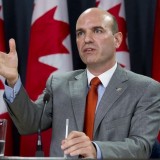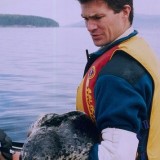Canadian politics has traditionally avoided the religion factor. By common agreement, belief has been deemed a private matter, a facet of a candidate’s qualifications for election that is not relevant to his or her ability to represent voters in parliament or to function as prime minister. The media has generally been respectful of this sensitivity and has averted coverage and commentary that touches on personal religious beliefs. This may be changing.
Most environmentalists and scientists, together with a growing number of Canadians and others, are often bewildered by Prime Minister Stephen Harper’s aversion to address or even to mention the spectre of global climate change. This profoundly important environmental issue is prominent in many political discussion in many countries of the world, an integral part of their budgets, economic plans and energy policies. All but a fringe minority now accept the essential science explaining climate change and are taking measures to reduce greenhouse gas emissions. Not so in Canada.
This lapse has focused attention on Prime Minister Harper, particularly because he is such a powerful and skillful political leader who meticulously manages, controls and directs much of Canada’s domestic and foreign policy — this nation’s governance is now the image of Stephen Harper. His response to environmental issues has been perplexing, provocative and worrisome. Green Party MP Elizabeth May outlines these concerns in her response to the government’s 2012 budget, the devious C-38 omnibus bill that devotes 170 of 425 pages to repealing, amending or otherwise weakening existing environmental regulations, while also withdrawing financial support from key scientific research that is environment related (Island Tides, May 17/12).
A mere sample is staggering: no funding for the Polar Environment Arctic Research Laboratory, the definitive and authoritative monitor of northern climate change; withdrawal of financial support for the Kluane Research Station, a 50-year project studying high-latitude ecological changes; the slashing of almost all marine pollution monitoring; and dissolution of the National Round Table on Environment and Economy, the only institution that attempts to find sustainable business options that are satisfactory to both industry and environmentalists. Despite arguing austerity, the government found an additional $8 million of scarce money for Revenue Canada to more closely monitor environmental charities to be certain excessive funds are not being used for “political” advocacy. “Nearly half of the budget implementation bill,” writes May, “is directed at re-writing Canada’s foundational environmental laws.” This includes the Fisheries Act, the Species at Risk Act, the Navigable Waters Protection Act and the Canadian Environmental Assessment Act. Decisions once based on public processes guided by science now move to ministerial discretion.
The Prime Minister’s seemingly anti-environment and anti-science agenda has prompted Andrew Nikiforuk, a prominent Canadian journalist, to search for the root cause of this behaviour. In his quest for an explanation, Nikiforuk has broken from convention, raised the sensitive religion issue, and written an opinion piece in TheTyee.ca (Mar. 26/12) titled, “Understanding Harper’s Evangelical Mission”, subtitled, “Signs mount that Canada’s government is beholden to a religious agenda averse to science and rational debate.”
Nikiforuk had obviously pondered the Prime Minister’s political behaviour, trying to explain why the leader of a modern, progressive and technologically sophisticated country would muzzle public comment by government-funded climate scientists, make no serious effort to cut greenhouse gas emissions, block or stall international agreements on greenhouse gas reductions, provoke the ire of every environmentally conscientious country on the planet, officially withdraw Canada from the Kyoto Protocol, promote rampant fossil-fuel development, and assiduously avoid any mention or discussion of climate change anywhere in his tightly controlled government. To an inquisitive journalist, this behaviour is an anachronistic idiosyncrasy that invites exploration.
Because the Prime Minister will not publicly discuss his religious views, Nikiforuk’s conclusions are conjectural. But the Prime Minister is known to belong to an Alberta fundamentalist Protestant church that espouses “evangelical climate skepticism”. Nikiforuk contends that this church holds seven tenets which “not only explain startling developments in Canada but should raise the hair on the neck of every thinking citizen regardless of their faith: 1. Disdain for the environmental movement, 2. Distrust of mainstream science in general, 3. Distrust of the mainstream media, 4. Loyalty to the party, 5. Libertarian economics as God’s will (God is opposed to government regulation or taxation), 6. Misunderstanding of divine sovereignty (God won’t allow us to ruin creation), 7. Unreconstructed Dominion theology (God calls on humans to subdue and rule creation).”
These are the tenets, Nikiforuk suggests, that could now be directing Canadian policy through the singular authority of the Prime Minister. “Any Canadian listening to the news these days,” he writes, “might well conclude that the Republican extremists or some associated evangelical group has occupied Ottawa. And they’d be righter than Job, I believe.”
Because of the guarded privacy of the Prime Minister, Nikiforuk’s evidence is only circumstantial — without any direct links, his operative word is “believe”. But this belief is strong enough to lead him into territory traditional journalism has not explored, and to open an avenue of consideration that Canadians have been too polite, or perhaps too naive, to explore. In doing so, he has robbed our politics of an element of innocence and added a complicating new dimension to our environmental challenges.





